May 14, 2010
The dusty streets of Zagora feel very far away and very long ago. It’s hard to believe it was only yesterday. The contrast between the desert and even a small town like Zagora couldn’t be more pronounced. When the wind dies down out here, it is perfectly still. Perfectly quiet.
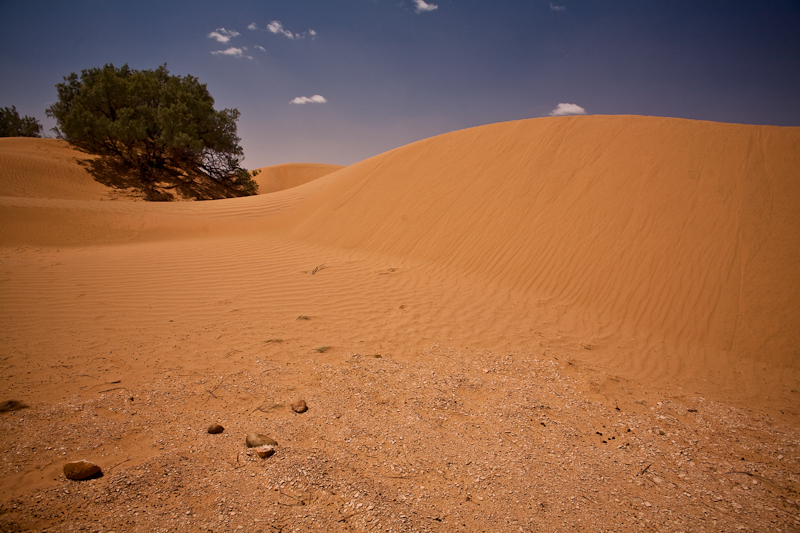
We are about six to ten kilometers from the camp where we spent last night. It is about 30 degrees Celsius in the shade right now, and we are passing the hottest part of the day under a desert tree. Our young guide, Rashid, 28, tells us it is called Tamarist in French, “Lit-luh” in Arabic, and “Tashwoodth” in Berber. He doesn’t know the English name. Rashid is himself Berber, descended from the desert nomads who once lived off the land in this area, but who have mostly settled down in nearby communities since Rashid’s grandfather’s time. He speaks only slightly more English than we do French, which is very little indeed, but we’ve been getting along well regardless of language difficulties. Hand gestures and our own searching French do surprisingly well, as we try various synonyms of what we want to say in the hopes of hitting upon the half-forgotten vocabulary of long-ago French classes. Although it is now just the three of us making our way into the desert, last night we enjoyed the company of four or five other young Berber men, most of them Rashid’s age.
The bivouac encampment we stayed in is design for some 20 to 40 visitors at capacity, but we were lucky enough to be the only two. It is just past the high season around here, a time when the desert starts to get too hot for most. The camp includes several heavy wool Berber tents for sleeping, a permanent squatter toilet outhouse, and a communal tent for preparing meals and relaxing among rugs, cushions and low tables. Our mouths were watering as we sat in the communal tent (named, without a hint of irony, The Restaurant), smelling the tajine stewing in the next room and enjoying traditional Berber music. Tajine is probably Morocco’s most signature dish (alongside couscous), and you can find it on menus throughout the country. A good tajine can be made from pretty much anything you’d put into a stew, and the best tajines use only the freshest local ingredients; oil, carrots, potatoes, onion, yams, almonds, dates, lemon, olives, and peppers are all common, though seldom found altogether in the same tajine. It can be a vegetarian dish, or include beef, chicken, fish or lamb. Really, anything goes, but what makes every tajine a tajine is the conical ceramic cooking dish, or swaoui, a proper stewing time of several hours, and the inclusion of the typical Moroccan spice medley: saffron, paprika, cumin, ginger, salt and pepper. The night’s tajine was served with bread, communal style in a large swaoui in the middle of the table, and was very delicious. We were surprised to get desert as well: a heaping plate of watermelon.
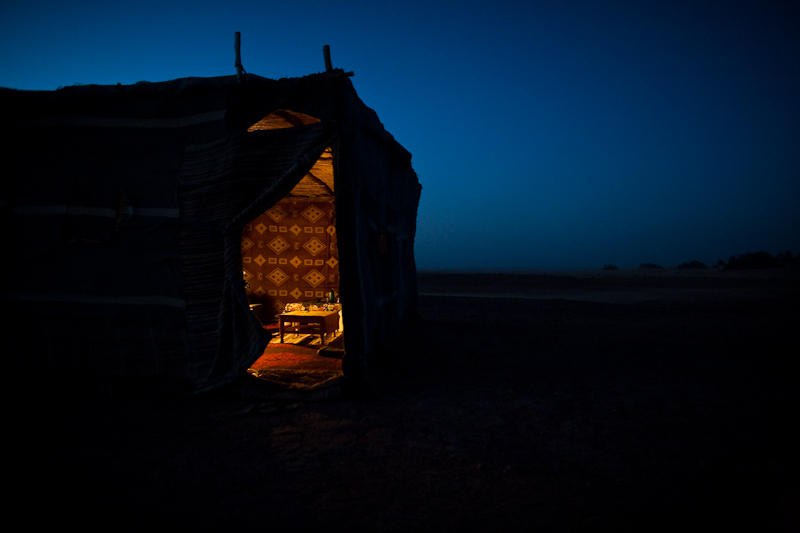
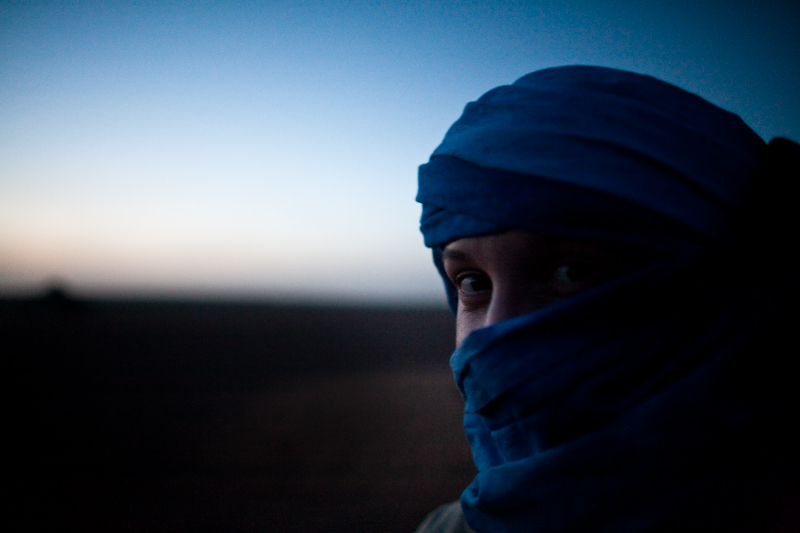
The music was a perfect way to bracket the meal, as our Berber companions began to “jam” while the tajine was just getting started, and picked up where they left off after dinner. It impresses me deeply whenever I am exposed to a culture or family with such integral music traditions. Although music is very important to me, and I was a musician myself some years ago, I was not raised in a participatory music tradition, and its not nearly as widespread in our culture than in many places in the world. In the West, musicians are specialized individuals who perform their trade for the entertainment of others. Among the Berbers, and cultures with similar traditions, everyone is a musician, and music is not something to watch or listen to so much as to make together. These traditions will always be stronger in a culture where individuals must depend on entertaining themselves and each other, rather than being entertained by electronic mass media.
But making and sharing music is universal; every culture in human history has folk music traditions. I think our easy access to prepackaged entertainment in the West has trained us away from the instinct to simply go for it.
Anyway, Laura and I did our best to simply go for it, taking our turns clapping along, as well as playing the cymbals, beating the drums and dancing. I also tried the lute, but with a foreign tuning scheme, ten strings and no frets, I found it far more difficult than guitar, and could only manage a few feeble notes. The Berber songs typically used a call-and-response singing structure and although the words were unintelligible to us, most of the songs were lamentations. The sorrowful wails in Arabic and (I assume) the Berber dialect of Tashelhit seemed to speak of tragedies and injustices borne out of the distant past. These were occasionally offset by more upbeat melodies, with the pounding rhythm of makeshift tam tams (drums) thumping into frenzied finales. Other songs were instrumental, led by the lute player, and seemed to include improvisational elements based around a traditional song structure.
After some encouragement Laura and I were induced to share the only piece of Canadiana that would come to mind, although I’m not sure “Barrett’s Privateers” has ever been accompanied by such African-influenced percussion. And I, for one, choose to believe it was that relentless rhythm that drove the lyrics clean out of my head, forcing us to repeat the first verse four or five times before begging off at last in an awkward ending that seemed to leave our new friends unsure what to make of it all. They didn’t ask us to sing again after that, which was fine by me.
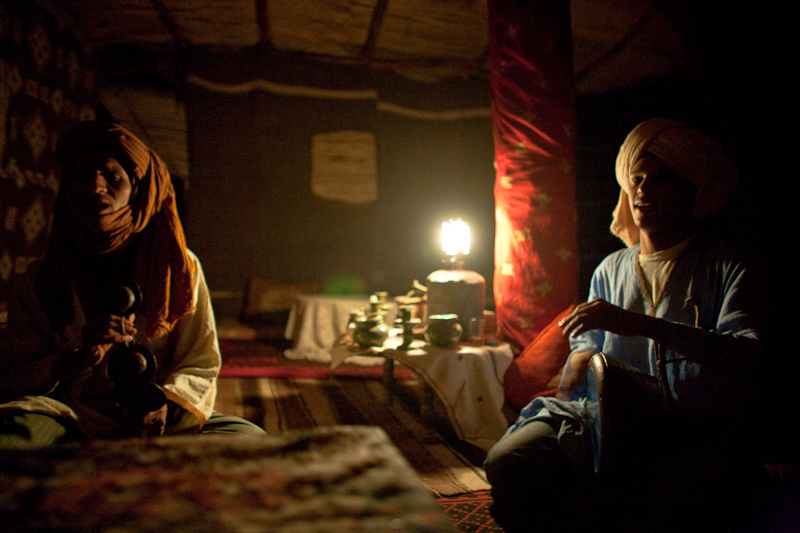
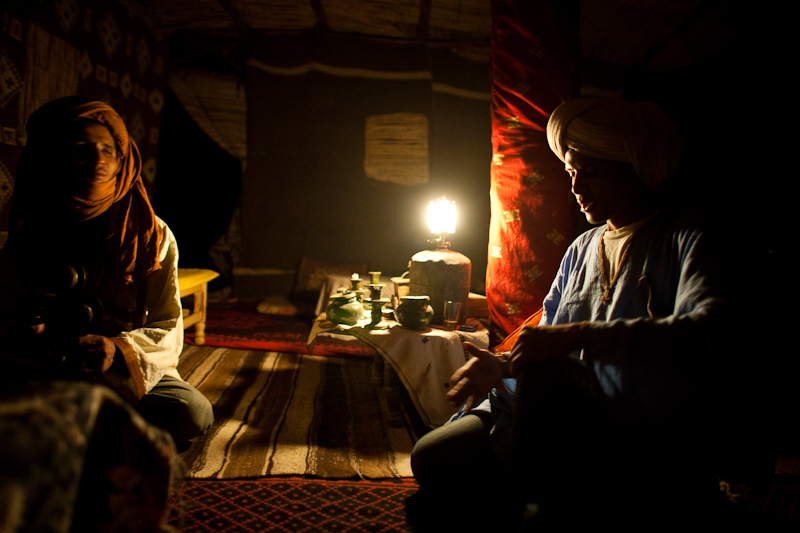
I’ve been in other situations where the ease with which those present share and participate in music has humbled me, and each time it forces me to ask myself: “Where are my songs?” On T.V.? The radio? The punk rock clique I was into as a younger man? The other music cliques and genres I could have fallen into had I made different friends? The folk music of cowboys? Of the maritimes? I enjoy these things but am neither cowboy nor maritimer. Where are my songs?
These young men know every word, can join in and improvise on a dozen or more traditional songs, passing the main rhythm drum and other instruments back and forth at will, sharing singing duties as needed. For them playing together is a daily routine, something to be savoured whenever and wherever they can come together in one place and time. These songs and the experience of sharing them are central to what makes them Berber.
Where are our songs?
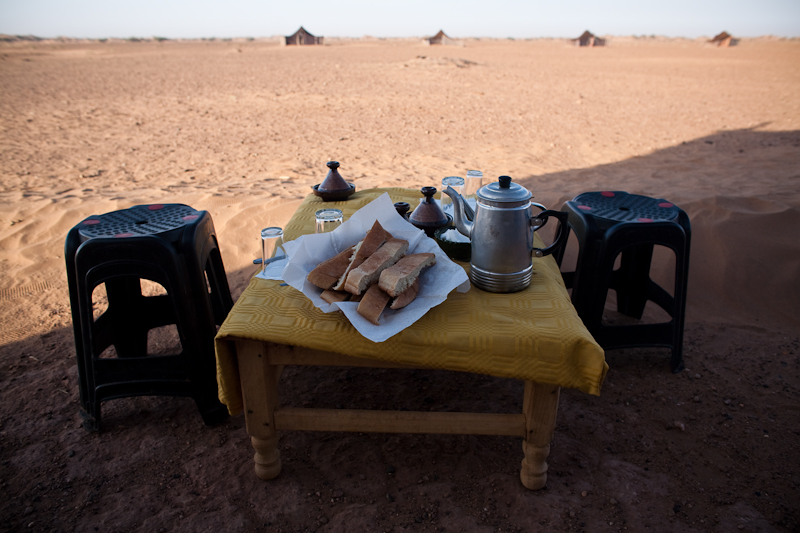
This is just one part of a six-part series on our camel trek in the Moroccoan Sahara. To read the full story, please click here.

Leave a Reply to Tait Cancel reply